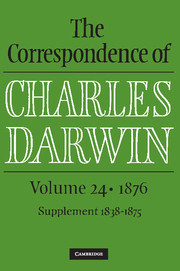Book contents
- Frontmatter
- Dedication
- Epigraph
- Contents
- List of illustrations
- List of letters
- Introduction
- Acknowledgments
- List of provenances
- Note on editorial policy
- Darwin/Wedgwood genealogy
- Abbreviations and symbols
- The Correspondence
- Supplement to the Correspondence, 1838–75
- Appendixes
- I Translations
- II Chronology
- III Presentation lists for Variation 2d ed., Cross and self fertilisation, and Geological observations 2d ed.
- IV Reviews of Cross and self fertilisation
- V Letters regarding the HMS Challenger specimens
- Manuscript alterations and comments
- Biographical register and index to correspondents
- Bibliography
- Notes on manuscript sources
V - Letters regarding the HMS Challenger specimens
from Appendixes
Published online by Cambridge University Press: 30 December 2016
- Frontmatter
- Dedication
- Epigraph
- Contents
- List of illustrations
- List of letters
- Introduction
- Acknowledgments
- List of provenances
- Note on editorial policy
- Darwin/Wedgwood genealogy
- Abbreviations and symbols
- The Correspondence
- Supplement to the Correspondence, 1838–75
- Appendixes
- I Translations
- II Chronology
- III Presentation lists for Variation 2d ed., Cross and self fertilisation, and Geological observations 2d ed.
- IV Reviews of Cross and self fertilisation
- V Letters regarding the HMS Challenger specimens
- Manuscript alterations and comments
- Biographical register and index to correspondents
- Bibliography
- Notes on manuscript sources
Summary
In his letter of 8 December 1876, Joseph Dalton Hooker enclosed the Royal Society of London Council minutes from the meeting of 26 October 1876 (Royal Society, Council minutes 4: 336–53). Most of the meeting consisted of the reading of letters between Vernon Lushington and Robert Hall, permanent secretaries to the Admiralty, William Law, secretary to the Treasury, Richard Owen, superintendent of the natural history departments at the British Museum, Albert Günther, keeper of the zoological department at the British Museum, John Winter Jones, principal librarian at the British Museum, and Charles Wyville Thomson, civilian scientific supervisor of the HMS Challenger expedition. Challenger had returned on 24 May 1876 after a three-and-a-half-year surveying voyage (Tizard 1885) and the letters mainly concern the natural history specimens collected on the voyage, where they were to be deposited, and the description of them in a published account.
Hooker, as president of the Royal Society, objected to Günther's report, in his letter to Jones of 21 June 1876 (see pp. 606–7, below), that Thomson wanted to keep the specimens for the foundation of a new museum in Edinburgh. Since the voyage was publicly funded, Owen and Günther had argued that specimens should be deposited with the British Museum for the benefit of the nation (see letter from Richard Owen, 7 June 1876, and memorandum from Albert Günther, 6 June 1876, pp. 603–6, below). Hooker sent the minutes to Darwin to ask for his opinion. In his reply of 11 December 1876, Darwin said that he felt that Günther had not behaved quite so badly as Hooker thought because he had given Thomas Croxen Archer (director of the Museum of Science and Arts in Edinburgh) as an authority for the rumour that Thomson wanted to keep the specimens in Edinburgh. However, Darwin felt that it was not necessary to accuse Thomson in order to establish the claim of the British Museum to the Challenger specimens. In his reply to Darwin, Hooker said that he still felt that Günther was in the wrong for believing Archer ‘without the slightest investigation’ (letter from J. D. Hooker, 13 December 1876). No reply from Darwin has been found responding to Hooker's defence of his original point.
- Type
- Chapter
- Information
- The Correspondence of Charles Darwin , pp. 602 - 617Publisher: Cambridge University PressPrint publication year: 2016



